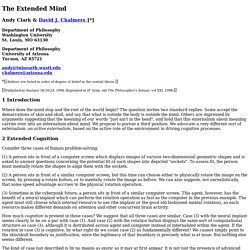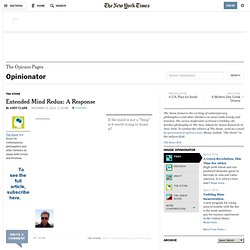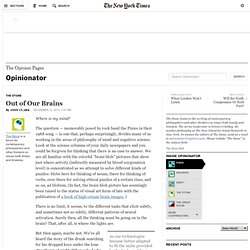

Inkido.indiana.edu/research/onlinemanu/papers/barabKirshintro.pdf. Future of Creativity. New Literacy. Big Data. Artificial Intelligence. Socially Distributed Cognition. The Extended Mind. Andy Clark & David J.

Chalmers [*] Department of Philosophy Washington University St. Louis, MO 63130 Department of Philosophy University of Arizona Tucson, AZ 85721 andy@twinearth.wustl.educhalmers@arizona.edu *[[Authors are listed in order of degree of belief in the central thesis.]] [[Published in Analysis 58:10-23, 1998. 1 Introduction Where does the mind stop and the rest of the world begin?
2 Extended Cognition Consider three cases of human problem-solving: (1) A person sits in front of a computer screen which displays images of various two-dimensional geometric shapes and is asked to answer questions concerning the potential fit of such shapes into depicted "sockets" . (2) A person sits in front of a similar computer screen, but this time can choose either to physically rotate the image on the screen, by pressing a rotate button, or to mentally rotate the image as before. . (3) Sometime in the cyberpunk future, a person sits in front of a similar computer screen. 3 Active Externalism.
Assistive Technology. Extended Mind Redux: A Response. The Stone is a forum for contemporary philosophers and other thinkers on issues both timely and timeless.

Thanks to all who read and commented on my recent Stone post, “Out of Our Brains.” Lots of interesting, challenging, and important issues were raised, but I’d like to react very briefly to just a few recurring themes, and to add one important, and accidentally omitted, note of thanks. The thanks (and see comment 73) are to professor David Chalmers. Dave was co-author of my original 1998 paper “The Extended Mind,” and is the sole author of a wonderful foreword to my 2008 book, “Supersizing the Mind.” Dave had a big hand in the original paper. If the mind is not a “thing” is it worth trying to locate it? I didn’t mean to downplay the pivotal role of the brain/body in human thought and reason.
This talk of the machinery of mind is important. Some respondents raised important and interesting questions concerning conscious experience. Out of Our Brains. The Stone is a forum for contemporary philosophers and other thinkers on issues both timely and timeless.

Where is my mind? The question — memorably posed by rock band the Pixies in their 1988 song — is one that, perhaps surprisingly, divides many of us working in the areas of philosophy of mind and cognitive science. Look at the science columns of your daily newspapers and you could be forgiven for thinking that there is no case to answer.